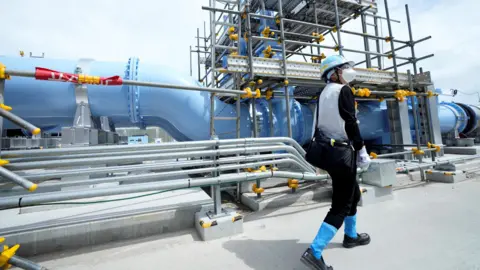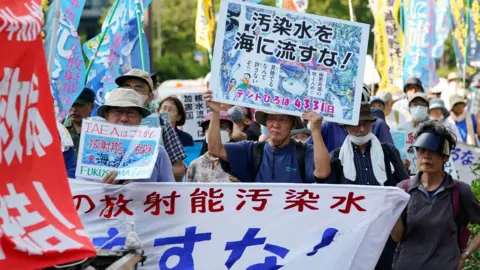Japan raises the goal of the nuclear energy in the main transformation after Fukushima
Tokyo correspondent
 Reuters
ReutersJapan says it will increase its dependence on nuclear energy in a significant shift in politics as it seeks to meet the increasing demand from energy -related sectors such as artificial intelligence and semi -conductors.
The energy plan approved by the Council of Ministers on Tuesday called for “maximizing the use of nuclear energy” and a reference to “reducing dependence on nuclear energy.”
Energy Planand Written by the Ministry of Economy, Trade and Industry It says that by 2040, nuclear energy should represent 20 % of the network supply in Japan in 2040, more than twice a share of 8.5 % in 2023.
It comes as Fukushima nuclear plant disaster From 14 years old, he is still hanging in the country, evoking painful memories.
In March 2011, Earthquake 9.0-Magnitde Near the northeastern coast of Japan, Tsunami was born killed more than 18,000 people, wipes entire towns and dumping Fukushima Dychi’s plant reactors.
Japan is now running 14 commercial nuclear reactions, compared to 54 before the Fukushima disaster when 30 % of the country’s energy was nuclear sources.
The plan still needs the approval of Parliament, as it will be discussed in the coming months.
The country, which imports 90 % of its fuel, said the energy plan.
 EPA
EPA“Because of the conflict in Ukraine and the war in the Middle East, even fossil fuels have become difficult to buy,” he told the BBC. “Japan is a country without energy resources, so we must use everything available in a balanced way.”
Yamagiwa added that energy burdens grow due to the demand from artificial intelligence data processing centers and semiconductor factories throughout the country.
But experts say the increasing dependence on nuclear energy will be fraught with risks and expensive.
Professor Kenichi Oshima, a lecturer at the College of Political Science at the University of Ryocoko, said Japan will need to import uranium, which is costly and will make the country depend on other countries.
Professor Kenichi told the BBC that the main concern is that increasing the number of nuclear power plants also raises the risk of possible catastrophic accidents.
A 2024 New Year’s Earthquake was martyred in the Nuto Peninsula, where two decades ago, a plan to build a nuclear plant was canceled because the local population opposed this.
“If there was a nuclear power plant there, it is quite clear that it would have caused a major accident,” he said.
Fukushima waved on the horizon
In Japan, any mention of nuclear energy inevitably re -memories about the nuclear collapse at the Dychi Energy Station.
“We all had a terrible experience at the time of the Fukushima earthquake,” Tokyo, Yuko Marwama, told Tokyo, told the BBC.
“How can I support her (nuclear energy plan)? I want the government to rely on other energy sources.”
“As a mother, I think about their safety. I can only think about what will happen in the future.”
The collapse in Fukushima is the worst in the world since Chenopille in 1986.
It sparked new controversy in 2023, when Japan began to launch treated water from the Fukushima Factory website. These protests were directed by Japan’s neighbors, including China, regarding safety concerns.
The United Nations atomic energy organizer IAEA said that wastewater is safe and will have a “little” effect on people and the environment.
In response to the new energy plan announced this week, Greenpeace said that the enhancement of nuclear energy is “impressive” when Fukushima’s repercussions are still ongoing.
The group said: “There is no justification for continuing to rely on nuclear energy, which is still toxic for tens of thousands of years, producing radioactive waste that requires long -term management and carrying risks such as earthquakes and terrorism.”
To achieve the government’s goal, experts say 33 reactors should be returned online, but the current pace of safety tests as well as population objections in some areas will make this difficult.
Many of these nuclear plants are old and will need to be rejuvenated with a new technology for them to work safely.
“This most difficult problem is that every nuclear power plant is in a different location and will need a safety protocol and infrastructure,” Yamagio said.
“We must check each of them carefully. It still takes some time.”
In recent months, the organizers have given many ancient reactors to continue the work.
In October 2024, the oldest reactor in Japan, Tawaka Nuclear Energy Station, was granted to operations, making it the first reactor in the country to obtain approval to work after 50 years.




